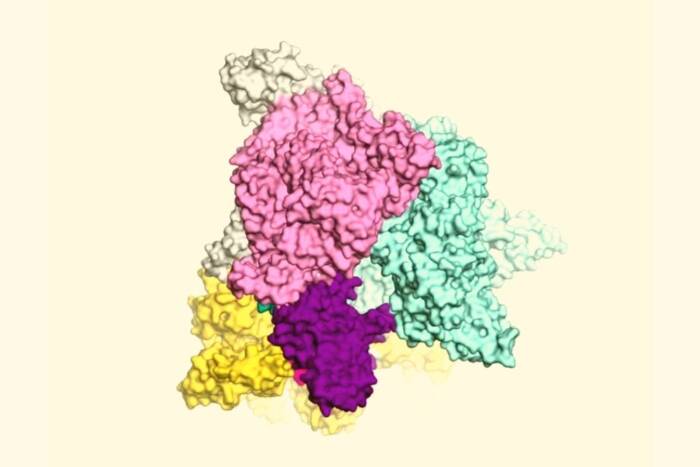Honorary degrees awarded to three Pearl Meister Greengard laureates
by AMELIA KAHANEY

“I wish to thank the members of the Rockefeller faculty for giving me the intense gratification of being here today in a room full of so many scientists I have worked with and admired over the years, and who I deeply respect,” said Dr. Le Douarin.
In addition to 28 students, three trailblazing women in science received degrees from Rockefeller this year. In a tradition dating back more than 50 years, the university awarded honorary doctorate of science degrees to distinguished individuals who have made notable contributions to bioscience: Nicole Le Douarin, a developmental biologist at the Collège de France; Mary Frances Lyon, a geneticist at the U.K. Medical Research Council, whose degree was awarded posthumously; and Brenda Milner, a neuropsychologist at McGill University. All three honorees are past recipients of the Pearl Meister Greengard Prize from The Rockefeller University, which recognizes the accomplishments of outstanding women in science.
Dr. Le Douarin was honored for her embryological work with the neural crest, a ridge that gives rise to most of the peripheral nervous system. Using chimeric embryos containing both chick and quail cells, Dr. Le Douarin found that precursor cells in the neural crest are, in effect, versatile stem cells, and that the migratory pathway these precursor cells take determines the type of cell they will become. Her work made essential contributions to the scientific understanding of how the brain and other structures of the nervous system form, as well as how the immune system develops. Dr. Le Douarin received her Ph.D. from the University of Paris. From 1975 to 2000, she was director of the Institute of Embryology at France’s National Center for Scientific Research, and she is permanent secretary of the French Academy of Sciences.
“Nicole is one of the giants of embryology. She developed an ingeniously simple genetic approach and used it to solve one of the most difficult problems in development,” said Mary E. Hatten, Frederick P. Rose Professor and head of the Laboratory of Developmental Neurobiology.

“Mary was delighted to have been offered this honor by Rockefeller University,” said Dr. Rastan, who accepted Dr. Lyon’s degree.
Dr. Lyon’s honorary degree recognizes her work in genetics. Intrigued by the mottled coat patterns of female mice who had inherited different variants of a color-determining gene, Dr. Lyon inferred that the splotchy coats resulted from random silencing of one of the female mice’s two X chromosomes, and thus one of two pigment genes in each cell. Her theory of X-chromosome inactivation suggested an answer to the longstanding question of how female cells can function similarly to male cells, which contain X and Y chromosomes; helped explain the inheritance of certain diseases; and shed light on the mechanisms of epigenetic regulation. Dr. Lyon received her Ph.D. from the University of Cambridge, and worked at the U.K. Medical Research Council in Harwell from the 1950s through her retirement, heading the genetics division there for many years.
“It seems that Dr. Lyon was always looking ahead to a future in which she saw great potential,” said Magda Konarska, Evelyn Gruss Lipper Professor and head of the Laboratory of Molecular Biology and Biochemistry. Dr. Lyon’s award was accepted by Sohaila Rastan, her second Ph.D. student and now the executive director of biomedical research at Action On Hearing Loss, a U.K. nonprofit dedicated to supporting people with hearing disorders.

“It has been a wonderful day, seeing the variety of scientific enterprises in which Rockefeller students are engaged, and at such a high level,” said Dr. Milner.
Dr. Milner was recognized for her research on memory. Working with a patient who had undergone surgical removal of several sections of his brain and so lost the ability to create long-term memories from new experiences, Dr. Milner found he could learn and improve upon a challenging drawing task—even though he could not recall performing the task from day to day. Her work with him and with other patients showed that episodic and procedural memory are different processes associated with different structures in the brain. This led to the hypothesis that the brain has multiple memory systems that govern specific functions. Dr. Milner received her Ph.D. from McGill University and a D.Sc. from the University of Cambridge. She is currently professor of psychology at the Montreal Neurological Institute and McGill University’s department of neurology and neurosurgery.
“The importance of Dr. Milner’s work to the history of neuroscience cannot be overemphasized,” said Leslie Vosshall, Robin Chemers Neustein Professor and head of the Laboratory of Neurogenetics and Behavior “Her scientific career that has spanned over six decades and counting has been an inspiration to scientists—particularly female scientists—worldwide.”


